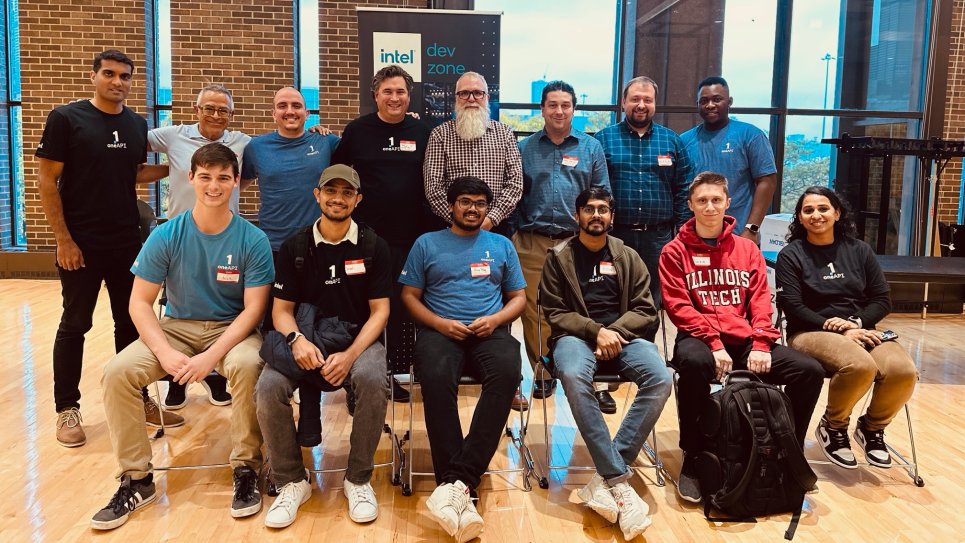
Group photo featuring Intel staff and faculty members in the back row with student ambassadors in the front row.
The Intel oneAPI Academic Hands-on Workshop welcomed nearly 100 computer science students for a full-day interactive workshop.
The U.S. Department of Energy’s Argonne National Laboratory, Intel and multiple Chicago area universities joined forces to host a hands-on workshop that introduced college students to oneAPI, a programming model used to develop code for diverse high-performance computing (HPC) architectures.
The Intel oneAPI Academic Hands-on Workshop, hosted in collaboration with faculty members from the University of Illinois Chicago (UIC), the University of Chicago, DePaul University, Illinois Institute of Technology, and Loyola University, welcomed nearly 100 computer science undergraduate and graduate students from across the region. Held at the UIC campus in October, the full-day workshop gave students an opportunity to gain experience with advanced HPC programming tools and techniques before they transition into the workforce.
“Introducing a new generation of researchers to emerging HPC tools like oneAPI is central to our efforts to broaden participation in HPC,” said Michael Papka, director of the Argonne Leadership Computing Facility, a DOE Office of Science user facility at Argonne, and professor of computer science at UIC. “This workshop is one of our many efforts designed to help build a pipeline of talent that will fuel future innovations in the computing sciences.”
Papka and ALCF computational scientist Sam Foreman kicked off the event by introducing Argonne, how its HPC and artificial intelligence (AI) resources are enabling scientific breakthroughs, and the lab’s Intel-powered exascale supercomputer, Aurora. Other topics covered included an introduction to oneAPI, examples of modern AI workloads with oneAPI, and a showcase of advanced computing opportunities with Argonne, Intel, and local universities.
“I think demonstrating the capabilities of Aurora and oneAPI to our students is just as important as demonstrating them to the current professionals in the industry,” says Foreman. “These students will eventually become our future research community, so we owe it to them to show what the future looks like.”
Revathi Dhotre, a graduate student studying computer science at UIC, attended the workshop to gain a better understanding of oneAPI and how it aligns and contributes to the software development pipeline.
“The presenters at the workshop portrayed all the technology in such an approachable way,” says Dhotre. “It made the software design process seem much less complicated and showed me how oneAPI can help streamline and improve application development.
Samuel Tetteh, a graduate student at DePaul University, came to the event to learn about the latest trends and innovations in machine learning, and to explore the potential applications of oneAPI's programming approach.
“I gained valuable insights into AI and how to use a simulation platform and training resources to further enhance my skills in software engineering for AI,” says Tetteh. “This knowledge will directly benefit my ongoing research projects, enabling me to improve their efficiency and effectiveness.”
He also appreciated the opportunity to network with peers while learning about state-of-the-art programming tools for HPC- and AI-driven research.
“I would absolutely attend this event again,” says Tetteh. “The blend of practical workshops, expert talks, and networking opportunities provided a comprehensive and enriching experience that is rare to find, and I must say I loved it."